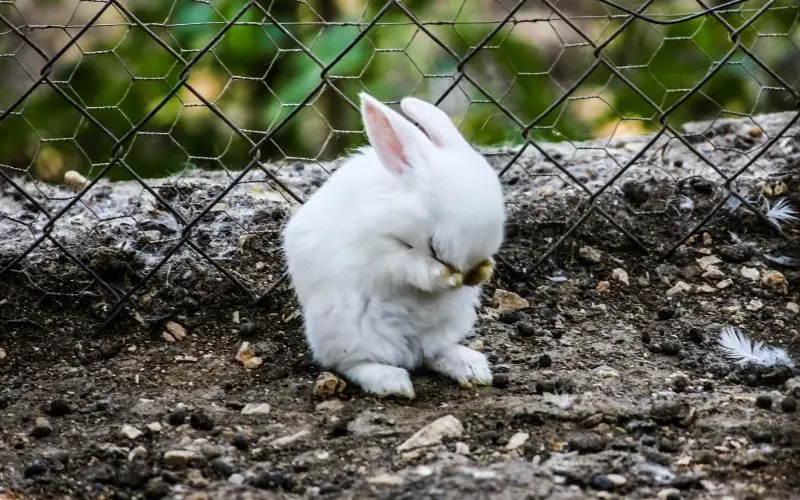There are times in our lives when we lose a person who’s so special to us that we can’t bear to look forward. But have you ever wondered how rabbits cope with such difficulties?
Like humans, rabbits can have lifelong friends and partners and if or when these partners pass, do they mourn? Do they understand the feeling of loss?
The answer is yes. A rabbit losing a partner can affect that rabbit’s behavior, habits, and life. Rabbits do go through mourning, several stages of grief, and at some point acceptance. However, you should never make your rabbit go through these phases alone. There are several ways to help your rabbit recover.
Jump to...
The bond that rabbits share is amazing
It’s no secret that rabbits are innate to be social creatures. When you introduce a rabbit to another rabbit, there’s going to be tension. But beyond that tension, there’s a yearning for companionship.

With the right situation and event, these 2 rabbits can bond and become life partners. They become emotionally connected and almost inseparable.
When one loses the other, there’s sudden despair. and you can also visualize this through the actions and the behavior of the one survivor.
It’s true and I don’t think I can describe the feelings that a rabbit has quite accurately enough to portray how the surviving rabbit feels.
If you were to separate a rabbit from its partner, the rabbit may make sounds as if it’s looking for its playmate. You may even hear sounds from a grieving rabbit such as whimpering, grunting, and even screaming because of it missing its partner.
Do Rabbits Remember Their Deceased Friends?
This is important to understand in the case of rabbits.
Rabbits have short-term memories that can be rather frustrating. You can introduce a new rabbit into your pet’s home and if you remove that rabbit shortly after, it’s possible that it won’t remember that rabbit after a certain amount of time.
Take, for example, when you are training your rabbit, you’ll realize that a rabbit can only retain short-term memories for around 4 minutes. That’s why it can be a little difficult to teach your rabbit things like potty training.
If a rabbit acquires something long-term, there’s a chance that it will never forget it. This is something that happens often with bad experiences.
By the way, as I’ve stated back in an old article that you should never hit your rabbit because that could be the very first step in getting your rabbit to never trust you again.
The same concept can be applied to a rabbit and its partner. Rabbits that share bonds may form a long-term memory lock that can never be forgotten. It can lead to a rabbit’s constant grievance and sadness.
Even separating a rabbit from his partner friend for more than a day can cause some subtle grievances. This is because as rabbits grow together, they learn that socialization is an everyday thing for them. Not being able to socialize, even for just 24 hours, can really cause some anxiety for your rabbit. The worries come from not knowing where its friend is and whether or not that friend is coming back.
When a rabbit loses a friend
I remember reading about how a rabbit owner recorded his rabbit’s experience after the loss of his partner. While grieving, the owner noticed how the area under the rabbit’s eyes was always wet.
During the loss, your surviving rabbit will often seem a little quieter than normal. It will be less playful as well.
Your rabbit needs time with its deceased partner
Rabbits don’t experience trauma from being in front of a dead partner.
In fact, it’s more beneficial to allow your rabbit time with its deceased friend, the body, so that it can accept what has happened.
If it’s possible, give your grieving rabbit a few hours (2-3 hours) with its deceased friend.
See, leaving the dead rabbit in the cage will allow the surviving rabbit time to process and understand the situation. Sniffing, nudging, and pressing on the body of the dead rabbit can solidify the understanding of what’s going on for the rabbit.
This helps your rabbit go through the mourning process.
Also, there’s been a lot of speculation as to repeated reports on rabbits performing some sort of motion and action when their friend dies. No one really understands this but it’s rumored to be a way for rabbits to send off their friend.
Functionally, it’s very similar to an open-casket funeral for humans.
The stages a rabbit goes through when it loses a friend
Early days
In the early days and weeks of a rabbit’s mate’s death, you’ll start to notice that your rabbit is no longer interested in many of the ordinary things it’s used to.
It may seem more lethargic than usual and it may also seem more aggressive as well. Every rabbit is different and some might even seek you further for comfort.
The key at this stage is to let it know that you are here and that you can grieve with it. Show your rabbit more attention and give it more love and hugs. Your rabbit will really appreciate it.
Coping with death
As stated, you must allow your rabbit time with the body of its deceased mate. This is a coping mechanism and it provides your rabbit with the closure it needs.
There are times when your rabbit may even perform a ritual around the body.
After you’ve buried the body, you’ll have to make it a habit to spend more time with your rabbit. It’s important that your pet and play with your rabbit as much as you can during these times.
Moving on
In the days of moving forward, you’ll have to decide if or when you’ll introduce your recovering rabbit to a new friend.
While being a single rabbit is not a bad thing, you’ll have to remember that rabbits are social creatures.
In the wild, they interact with species of their own in groups known as fluffles or colonies. While accepting new members isn’t an easy task, it may be something that’s required in the long run.
What can you do to help your rabbit?
1. Let your rabbit say its goodbyes.
Give your rabbit time with its friend. Leaving the body of the dead rabbit in the vicinity of your rabbit may help it come to grips with what has happened.
Rabbits may not see a dead body the same way as humans do, but they do need that time to understand that their friend is not coming back.
If you don’t do this, you run the possibility of your rabbit always looking, always trying to find his friend which could lead to even more depression and worry. What I suggest, is to give your rabbit some closure. Let it know that its friend is no longer with us.
This will give your rabbit a reason to move forward.
2. Keep a close eye on your rabbit.
Depression is one of the things you should be worried about for your surviving rabbit. This is the part where you as the owner need to be vigilant in watching over your grieving rabbit.
A mate’s death can create really serious mental issues with the survivor.
Watch for depression, change of eating habits, and its willingness to move around and play. It’s your duty to make sure your rabbit recovers in a healthy and appropriate way.
Give your rabbit more attention than it had before. Show it more affection, more love. I know this sounds odd, but I can assure you that your rabbit needs it.
Every rabbit is different and every rabbit will react to the death of a friend differently. But they shouldn’t have to deal with it alone. That’s why you’re here.
3. Give your rabbit something to keep its mind busy.
Giving your rabbit a toy may help alleviate the pain it’s feeling. Your job is to help it recover and help it move on.
Showering your rabbit with activities and shiny new objects will help get its mind off the subject of its friend. This may help the process of grieving and also help your rabbit recover sooner.
Providing your rabbit with a soft and fluffy stuffed animal may also help it deal with grief. With a stuffed animal, your rabbit will be able to snuggle up with the toy and know that everything will be okay.
4. In due time, consider finding your rabbit a new friend.
This is a touchy subject. The question isn’t if, but when should you find your rabbit a new mate. Your rabbit may not be ready and that could be bad for your rabbit and your new member.
But in essence, give your rabbit time and when it looks like it’s back to eating normally, playing normally, and acting normally, then you can maybe introduce a new friend to your rabbit.
This may turn out to be a trial and error moment because not all rabbits are acceptance of one another. You’ll have to let your rabbit decide who it decides to play with and who to trust.
I wrote an article on how to get two rabbits to bond and share things. You can check out this article called “Can Rabbits Share a Litter Box?” The Official Guide!” if you’re interested in knowing how and what to do.
FAQ
Do rabbits forget each other?
There are 2 sides to this story. Short-term bonds are likely to be forgotten, but rabbits have great memories when it comes to long-term bonds. A rabbit will likely remember the death of a partner for the rest of its life.
How can you tell if your rabbit is sad?
If you ever see your rabbit display signs of lethargy, lack of appetite, pacing, biting, pacing, and hunched over, there’s the possibility of it being sad. A stronger signal of this is if these behaviors happen right after the death of a rabbit friend.
Can rabbits cry?
Rabbits have been known to shed tears in moments of intense sadness. For example, when a partner dies, you may see wet fur around the eyes of the surviving rabbit.
How long do rabbits live?
Rabbits have been known to live an average of 9 years with some even reaching as old as 12. Much of the criteria depends on environmental conditions, food, disease, and predatorial factors.
Can rabbits live alone happily?
Rabbits can live alone, but as social creatures, they will need you to pay attention to their needs. Rabbits will want to play, snuggle, and be petted by you to keep them happy. It’s recommended to get your rabbit a partner so that it will always have a friend to bond with.
How do I know if my rabbit is lonely?
Some rabbits will display signs of loneliness. While it’s not specific to loneliness, you can get a clue if your rabbit is trying to get your attention by nudging, biting, and even following you.
Other interesting articles:
